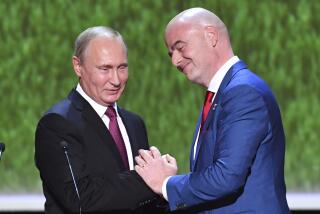WORLD CUP USA ‘94: SEMIFINALS : Tearing Down the Wall : Success of Bulgaria, Romania Marks Only Beginning of Change in World Soccer
- Share via
EAST RUTHERFORD, N.J. — Don’t feel bad for Dimitar Penev just because he has to work on his birthday.
Penev, who turns 49 today, has reason enough to celebrate. In the last month he has gone from almost complete obscurity to worldwide fame.
In fact, it would be fair to say that when he blows out the candles today, his name will be recognized by more people than that of Zhelyu Zhelev.
Penev is Bulgaria’s soccer coach. Zhelev is Bulgaria’s president.
Amazing what a little thing like a World Cup victory can do for a man. And for a country.
After Bulgaria had knocked defending champion Germany out of the tournament on Sunday, both Zhelev and Lyuben Berov, the country’s prime minister, immediately were on the phone to Giants Stadium, calling to congratulate Penev and his players.
As every politician knows, it never hurts to tie your name to a winning team.
This is Bulgaria’s moment in the sun. After never having won a World Cup game in 16 attempts dating from a 1962 loss to Argentina in Chile, the Bulgarians find themselves in the 1994 semifinals.
And not as the underdogs, either. Having already beaten two-time champion Argentina and three-time champion Germany, Bulgaria is at least even money to do as well against three-time champion Italy.
And after that? Three-time champion Brazil in the final?
It’s not too much to dream, as Penev is finding out this summer.
But Bulgaria is not alone in celebrating this World Cup. Had it not been for the heroics of Swedish goalkeeper Thomas Ravelli, Romania, too, would have been taking part in Wednesday’s semifinals.
For a long time Sunday, there were comments, only half in jest, about the possibility of a Bulgaria-Romania final at the Rose Bowl.
What’s going on here? Why are the supposed “unknowns” from Eastern Europe suddenly in the limelight?
Sportswriters--and not only Americans--who earlier would not have known Basarab Panduru from Plamen Nikolov, have been tripping over themselves in the last few weeks, trying to learn the life stories of such players as Ilie Dumitrescu and Borislav Mihaylov.
You know things have gotten out of hand when the balding dome of Bulgarian midfielder Yordan Letchkov becomes the subject of postgame questions.
Is it a case of--you will pardon the expression--hair today, gone tomorrow?
Will the Bulgarians and Romanians fade into obscurity once the World Cup is over, or is there a new order to the soccer world?
The truth is, European soccer is undergoing a huge change. The end of communism and the breakups of the Soviet Union and Yugoslavia have profoundly altered the international sporting landscape.
Call it the fall and rise of Eastern European soccer. Communism’s fall and soccer’s rise.
To better illustrate the point, consider the 1996 European Championship in England, qualifying for which gets fully under way in autumn.
Always before, the qualifying competition was a fairly straightforward affair. But when the preliminary draw was held in Manchester, England, earlier this year, organizers found they now had 49 countries seeking a place in the final tournament field of 16.
It once seemed as if Europe consisted of only a couple of dozen countries. Now there are 50. A host of new or resurrected nations are on the scene, many of them from what used to be called “behind the Iron Curtain.”
Every one of those countries has a national team. Every one of those national teams aspires to be the best in Europe. And many of them have players who, if they are given half a chance, can rise to international stardom.
Romania’s Gheorghe Hagi and Bulgaria’s Hristo Stoitchkov are but the tip of the iceberg, the most recognizable Eastern European stars in this World Cup. There could have been more.
Had Yugoslavia not degenerated into a civil war, it would have provided a much better team in the tournament than Greece, whose feeble effort showed that it had only qualified because Yugoslavia was banned from international competition.
Similarly, had Russia’s soccer federation not become embroiled in an unseemly internal squabble pitting the players against the coach and federation, it could have brought its first team to the United States and we would have seen such legitimate stars as Andrei Kanchelskis, Igor Shalimov and others.
Then, too, the former Czechoslovakia, a World Cup quarterfinalist in 1990, has officially split into two separate states, Slovakia and the Czech Republic. Once each of them puts its soccer house in order, they will be back challenging Europe and the world’s best.
Croatia demonstrated Eastern Europe’s potential this spring when it traveled to Spain and scored a deserved 2-0 victory over the Spanish, who came very close to reaching the semifinals of this World Cup before bowing to Italy.
Ukraine, which once provided most of the Soviet Union’s national team players, is sure to discover its own strength in the not-too-distant future. The same applies to former powers Hungary and Poland.
The difficulty facing Eastern European teams, on both the club and national team levels, is money. With their nations’ economies strapped for cash, it is no surprise that their soccer federations are, too.
The Bulgarian federation, for example, was on the verge of bankruptcy and was saved only by Emil Kostadinov’s last-minute goal against France that qualified Bulgaria for the World Cup. The federation stands to earn $1-2 million from the tournament, enough to give the players sizable bonuses and restore solvency to the federation.
Others federations are not so fortunate.
National teams are made up of the best club players. But clubs with no money can’t buy top players and therefore can’t qualify for or compete well enough in European competition to earn the money that such competition brings.
As a result, these clubs have to raise what money they can by developing promising young players and then selling them to wealthier clubs abroad.
Such capitalistic ventures were not permitted under the old communist regimes, but now there is a lively market in Eastern European soccer talent, a market that will only become more frenzied because of the success of Bulgaria and Romania in World Cup ’94.
Breaking New Ground
The record of Bulgaria in World Cup finals:
* 1962: Eliminated in first round with an 0-2-1 record. Outscored, 7-1
* 1966: Eliminated in first round, losing all three games. Outscored, 8-1.
* 1970: Eliminated in first round with an 0-2-1 record. Outscored, 9-5.
* 1974: Eliminated in first round with an 0-1-2 record. Outscored, 5-2.
* 1986: Eliminated in second round, after going 0-1-2 in group play. Lost to Mexico in round of 16. Outscored, 6-2.
* 1994: Advanced to semifinal Wednesday against Italy, going 3-0-1 after losing opener to Nigeria. Outscored opponents, 9-5.
More to Read
Go beyond the scoreboard
Get the latest on L.A.'s teams in the daily Sports Report newsletter.
You may occasionally receive promotional content from the Los Angeles Times.







